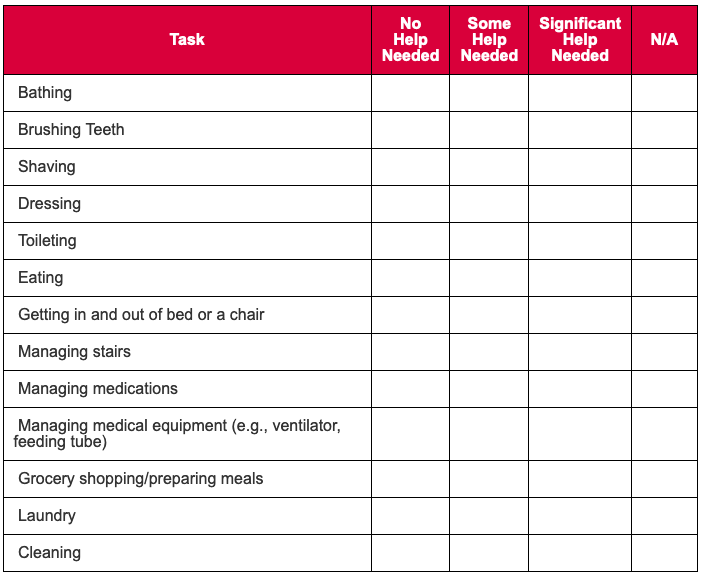
Hiring in-‐home assistance can help you cope effectively with the everyday challenges of living with ALS, as well as relieve some of the pressure on family caregivers. But sometimes, it can be difficult to make the decision to bring on additional support. Here are some guidelines that can help you with the decision process.
Recognizing the need for in-home help
Arranging for in-‐home help can give both you and your family members the support you need to live an enjoyable and full life. Still, many people put off hiring in-home help until an emergency or change in condition forces the issue. Being alert to changes in your (or your loved one’s) condition and abilities can help you to proactively recognize that assistance is needed, so you can arrange for help before a crisis occurs. Here are some red flags that may indicate it is time to hire outside help:
For the person with ALS
- Are you having increased difficulty accomplishing basic personal care tasks, such as bathing, brushing your teeth, dressing, or using the toilet?
- Are you having increased difficulty preparing meals or eating?
- Are you finding that you need more assistance to get out of bed or a chair, or to move from place to place?
- Are you having increased difficulty communicating?
- Do you worry about your safety when you are alone?
- Do you need help managing your medications?
- Are you finding it difficult to complete routine household tasks?
For family caregivers
- Are the additional responsibilities related to caring for your loved one starting to take an emotional or physical toll on you?
- Are you finding it difficult to manage caregiving responsibilities in addition to your other responsibilities, such as those related to work, caring for children, or maintaining the home?
- Are you neglecting your own needs because there are simply not enough hours in the day?
- Have you noticed a change in your loved one’s appearance or physical condition? For example, is he or she losing too much weight? Does he or she appear disheveled or unkempt?
- Have you noticed a change in your loved one’s emotional status? For example, is he or she showing signs consistent with depression, such as becoming withdrawn or unusually irritable, losing interest in activities that used to be pleasurable, or sleeping or eating more or less than usual?
- Have you noticed that your loved one is having trouble managing his or her medications?
- Does your loved one need skilled care beyond what you can provide (e.g., ventilator assistance; physical, occupational, respiratory, or speech therapy)?
- Are hospital admissions becoming more frequent?
- Do you worry about leaving your loved one alone?
Determining the areas where you need help
Once you decide to hire in-‐home help, completing the following worksheet can show you the specific tasks where additional help could be of the most benefit. This can help you decide what type of home care assistance— medical, non-‐medical, or both— is most appropriate for your situation.

If you are the family caregiver, think about what type of help would be most beneficial to you. Would help with your caregiving responsibilities be most useful? If so, keep track of your daily activities and then review it to see when you need the most help, and with what tasks. Or would free time to do things such as exercise, visit with friends, or pursue a hobby be of the most benefit? If so, consider arranging for respite care (either at regular intervals or on an as-needed basis), or hiring help to handle non-caregiving tasks (such as housework or grocery shopping) to free up some of your time.
Finding in-home help
Many people choose to hire in-‐home help through an agency. A non-medical home care (companion) agency can match you with helpers who provide non-medical services, such as assistance with personal care, light housekeeping, or respite care. A home health agency manages the delivery of different types of in-home health care, ranging from assistance with personal care and housekeeping tasks to skilled nursing and therapy services. In addition to matching you with caregivers to meet your needs, the agency handles tasks related to managing personnel, such as providing liability insurance, overseeing scheduling, managing payroll and taxes, and handling performance issues.
Hiring in-home help on your own is also an option, but if you choose to go the independent route, know that the tasks related to managing personnel that would normally be handled by an agency will become your responsibility. Members of the ALS community or friends may be able to provide recommendations. You can also advertise for help in places like senior centers, college career centers (especially those with nursing programs), and places of worship. Another option for locating potential candidates is through an employment (registry) agency. The employment agency collects a referral fee for matching you with a suitable employee. The agency may conduct screening and background checks on the candidates they list on their registry, but most of the tasks related to being an employer will be your responsibility.
“Activities & Instrumental Activities of Daily Living — Definitions, Importance and Assessments.” American Elder Care Research Association, February, 2016.
“Hiring In-‐Home Help.” Family Caregiver Alliance, November, 2001.
“Hiring Someone to Help with Home Care.” American Association of Retired Persons, August 20, 2012.
